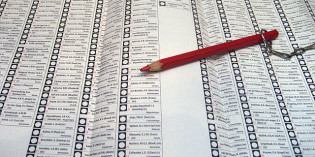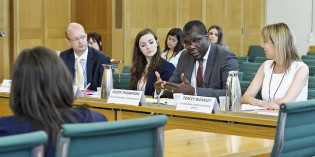Tag: Political Parties

The media’s gatekeeping function means that party press coverage often reproduces and reinforces existing power structures
In election campaigns, parties and candidates want to get their message across to the public, and the central means of doing so is by generating media coverage. Yet, the media does not slavishly pay attention to each party’s campaign messages. Which actors are most likely to hit the media? And which campaign messages are most […]

Not all parties lose members but those that do are older and more institutionalised
Party membership is often cited as uniformly in decline across European democracies. However, this might be an untenable statement as a look at annual party-level data of 47 parties in six European countries between 1960-2010 reveals. Ann-Kristin Kölln argues that almost a quarter of the parties have not been losing members and that membership decline […]

The UK’s political parties need to adapt if they are to retain a sustainable footing in the 21st Century
Political parties are in decline, with membership and party identification both falling. How can they remain relevant in the 21st Century when the foundation on which they rest are disintegrating? Jess Garland argues that there is hope for parties in the modern world – but that they have to adapt to survive. Similar PostsLearning the […]

UK voters see divided political parties as less able to make sensible or coherent policies
It is often said that ‘divided parties lose elections’, with the experience of the Conservatives in the 1990s cited as supporting evidence. But is this the case? Looking at evidence from the British Election Survey (BES), Zachary D. Greene argues that perceptions of party disunity does indeed play a role in how voters assess the […]

Political parties need to better integrate young members and give them the chance to influence policy
Most major political parties have youth wings, run by their young members. But with party membership declining, Emily Rainsford has considered how parties might better engage their young members and recruit others. In this post, part of our new series on youth participation, she argues for more integration of young party members into decision-making structures. Similar PostsYoung […]

Why all our top parties are doing voters a disservice by cramming the European Parliament ballot papers with the names of ‘no hope’ candidates
When British voters go to the polls on 22 May to elect MEPs to the European Parliament for another five years, they will face complex ballot papers with large number of candidates on them. The Democratic Audit team explain how the List PR system works and show how all the major parties follow practices that […]

The Conservatives’ disastrous primary election in South East Cambridgeshire should not deter other local parties from using primaries
The Conservatives recently selected Lucy Frazer as their parliamentary candidate for South East Cambridgeshire following a mishandled primary election that, bizarrely, mirrored the plot of a Jeffrey Archer novel. Chris Game looks back on the episode in the context of the David Cameron’s efforts to introduce primaries to select candidates across the party, urging him and […]

Book Review: Democratic Decline and Democratic Renewal: Political Change in Britain, Australia and New Zealand
Ian Marsh and Raymond Miller link the decreasing quality of democracy to the failings of political parties in Democratic Decline and Democratic Renewal. This detailed study of the politics of the UK, Australia and New Zealand is an ambitious attempt both to document decline and to reverse the trend, finds Jack Simson Caird, who is impressed by the […]

The Polish and Romanian experiences show that party elites need to loosen control when introducing primary elections to select candidates
The Conservatives experimented with primaries at the 2010 general election, and Ed Miliband has recently proposed their wider introduction to choose Labour Party candidates. Sergiu Gherghina and Michal Radecki believe primary elections can bring significant benefits for parties and democracy as a whole, but warn that the UK needs to avoid mistakes made in Poland and Romania […]

Tomorrow’s party: a bold new approach and meaningful engagement are required
Political parties are an indispensable part of any functioning democracy, essential for aggregating political demands and educating voters about policies. But the public have seldom thought less of them, with a majority of voters considering them corrupt. The Electoral Reform Society have recognised this, and launched a new project to look at what the party of the […]


 Democratic Audit's core funding is provided by the Joseph Rowntree Charitable Trust. Additional funding is provided by the London School of Economics.
Democratic Audit's core funding is provided by the Joseph Rowntree Charitable Trust. Additional funding is provided by the London School of Economics.